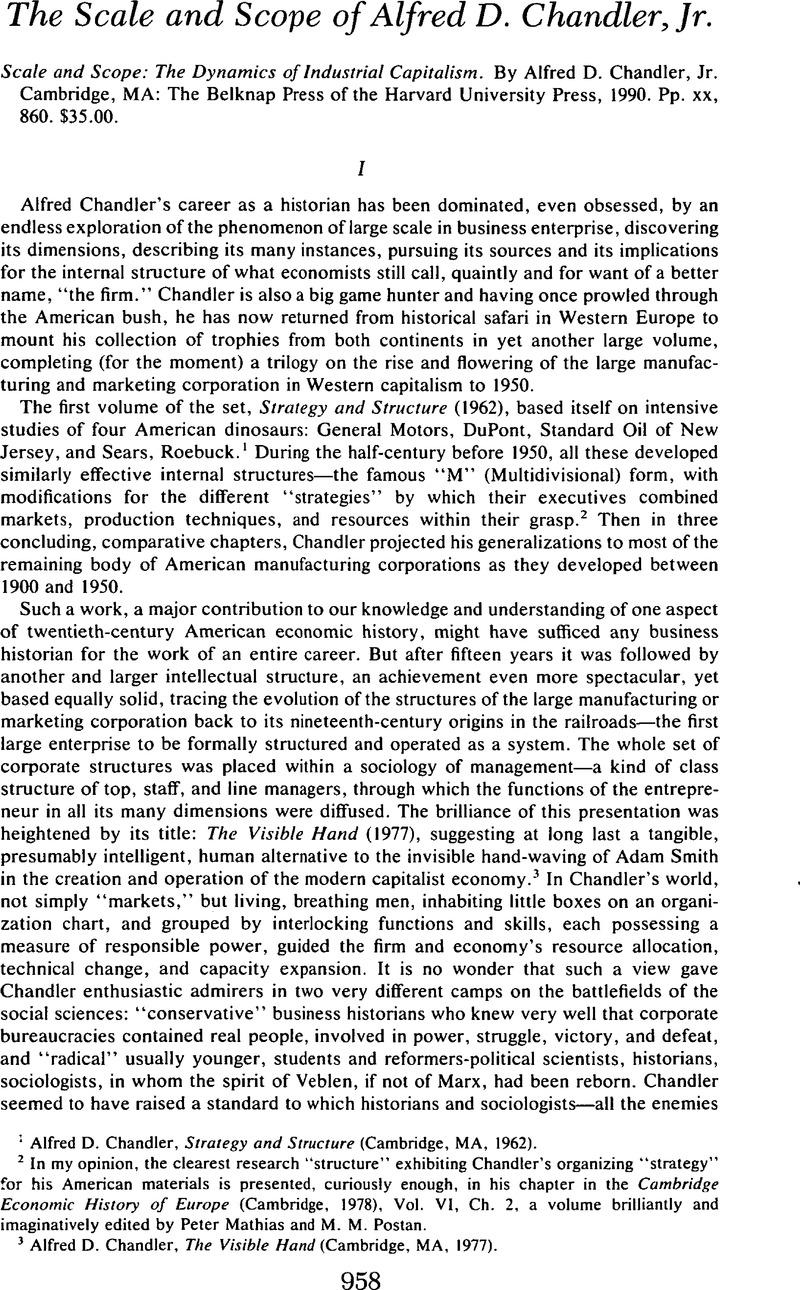Article contents
The Scale and Scope of Alfred D. Chandler, Jr.
Review products
Published online by Cambridge University Press: 03 March 2009
Abstract

- Type
- Review Article
- Information
- Copyright
- Copyright © The Economic History Association 1991
References
1 Chandler, Alfred D., Strategy and Structure (Cambridge, MA, 1962).Google Scholar
2 In my opinion, the clearest research “structure” exhibiting Chandler's organizing “strategy” for his American materials is presented, curiously enough, in his chapter in the Cambridge Economic History of Europe (Cambridge, 1978), Vol. VI, Ch. 2, a volume brilliantly and imaginatively edited by Mathias, Peter and Postan, M. M..Google Scholar
3 Chandler, Alfred D., The Visible Hand (Cambridge, MA, 1977).Google Scholar
4 The revolutions of 1989 have returned the continent, divided in two by the Cold War, to its original, tri-partite division of Northern (Germanic), Eastern (Slavic), and Southern (Romanic), plus the Celtic stratum in the West. Culturally speaking, “Western Europe” exists not on the eastern but on the western shore of the Atlantic—in the huge hour-glass shaped hemisphere and the two receptacles it has furnished for the “aboriginal” inhabitants, and for the immigrant European, African, and Asian ethnic materials poured into the Anglo-French social and political structures in the North and the transplanted Luso-Hispanic governing cultures of the South.Google Scholar
5 Indeed, in a recent interview he was passionately outspoken even on the subject of the ownership rights of stockholders: Q. What have we been doing wrong? A. We are going to pay a price for shareholder capitalism. Among the 50 largest chemical companies in the world, the only ones that pay over 10% dividends are the Americans, and they pay 15%. If you really believe—this is where I get upset—that the function of the firm is to give dividends to shareholders, were going to end up worse than Britain. Intel has never declared a dividend and it has put a billion dollars back into the business. That's the way to do it. Financial World, June 25, 1991, p. 42. “Shareholder capitalism” is presumably the governance of the corporation by the annual assembly of the shareholders, which students used to be taught to call “shareholder democracy.”Google Scholar
6 In the same interview, quoted above, Chandler allows himself the following disturbing historical observation: Q. What about Japanese managers? What are they doing right? A. The Japanese are the most management-intensive companies in the world, for good historical reasons—the one key being that they have moved directly from the middle ages, literally a feudal society, to a modern society. Financial World, June 25, 1991, p. 42. Where indeed would the historian be if the whole 500 years of small-scale mercantile competitive capitalism had been skipped over in the West? Where indeed would Japan be today in that case?Google Scholar
7 See The Southern Economic Journal, 23 (Apr. 1957), pp. 468–69, for a clue.Google Scholar
- 3
- Cited by


